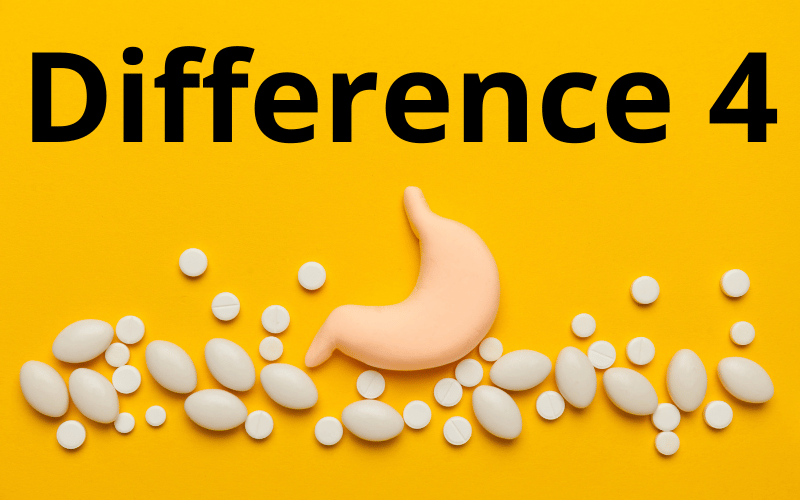Difference 4: Complications & Risks

Gastritis
When gastritis stays for the long haul, the stomach lining’s continual assault can lead to peptic ulcers. These are open sores that form on the inner lining of the stomach, and they bring along their own suite of pain and discomfort, upping the ante in the gastritis game. Chronic gastritis, particularly when spurred on by H. pylori, increases the risk of certain types of stomach cancers. While this doesn’t mean everyone with gastritis will develop cancer, the correlation remains significant, warranting monitoring and proactive interventions.
The erosion of the stomach lining can sometimes lead to bleeding. While it might not always be overt, telltale signs can appear in vomit or stools, signaling that the stomach’s protective layer is compromised to the point of bleeding. A stomach that’s perpetually inflamed isn’t the best at its job. This can result in malabsorption of critical nutrients like Vitamin B12, leading to associated deficiencies and complications like anemia.
While it might seem unrelated, prolonged discomfort and the associated lifestyle limitations from gastritis can play havoc with one’s mental health. There’s a potential for increased anxiety, stress, and even depression, emphasizing the need for holistic care.
Gastroenteritis
Gastroenteritis’s most notorious complication is dehydration. The rapid loss of fluids through diarrhea and vomiting can result in a significant imbalance, affecting everything from kidney function to electrolyte balance. With fluids, essential salts also make an exit, leading to imbalances. Sodium, potassium, and chloride – vital for muscle and nerve functions – can dip, manifesting as muscle cramps, dizziness, and even irregular heartbeat in severe cases.
Particularly in infections caused by certain strains of E. coli, there’s a risk of HUS, a severe condition characterized by kidney failure. While rare, its implications can be life-threatening, making it essential to be aware of this potential complication. Post-infection, some folks might experience lingering digestive issues. Dubbed post-infectious irritable bowel syndrome, this condition can have symptoms like altered bowel habits, abdominal pain, and bloating, extending the gastroenteritis narrative beyond the initial infection.
In certain cases, especially if the causative agent enters the bloodstream, what starts as a localized gut issue can spiral into systemic symptoms. These can range from muscle aches and joint pain to skin rashes, showcasing the wide-reaching impacts of severe gastroenteritis. (4)